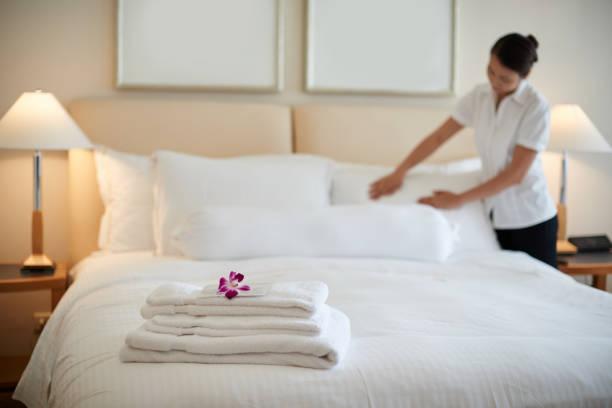
Noida: We often underestimate how much time we spend in our beds or how closely our clothes and bedding stay in touch with our skin. But did you know that neglecting to wash these everyday essentials can turn them into breeding grounds for bacteria, fungi, and dust mites? Doctors warn that poor hygiene habits with underwear, bedsheets, and pillows can lead to infections ranging from simple skin rashes to more serious respiratory problems.
Underwear: Daily wash is non-negotiable
- Why? Underwear comes in direct contact with sweat, natural body secretions and bacteria. If not washed after every single use, it can lead to urinary tract infections (UTIs), yeast infections, and skin irritations.
- Doctor’s Advice: Wash after every wear. Avoid reusing underwear even for a short duration.
Bedsheets and pillowcases: The hidden germ carriers
- Why? Bedsheets absorb sweat, dead skin cells, oils, dust, and even pet dander. This becomes a perfect environment for dust mites, bacteria and fungi to thrive. Unwashed sheets can trigger allergies, acne breakouts, asthma, and eczema flare-ups.
- Doctor’s Advice: Wash at least once a week. If you sweat heavily, live in humid areas or have allergies, wash every 3–4 days.
Duvet covers and blankets: The overlooked layer
- Why? These layers may not touch the skin directly, but still collect dust, allergens and bacteria. Irregular washing increases the risk of respiratory infections and prolonged skin exposure to irritants.
- Doctor’s Advice: Wash duvet covers every 2–4 weeks and blankets/comforters every 2–3 months.
Pillows: When to wash and replace
- Why? Pillows trap sweat, drool, hair oil and allergens. Over time, they become a hotspot for fungal spores and dust mites, which can cause sinus infections, chronic cough or allergic reactions.
- Doctor’s Advice:
- Wash washable pillows every 3–6 months.
- Use protective covers for memory foam pillows.
- Replace pillows every two years to avoid long-term allergen buildup.
What happens if you neglect hygiene?
- Skin issues: Pimples, rashes, eczema flare-ups.
- Respiratory problems: Dust mite exposure can worsen asthma and allergies.
- Infections: Prolonged exposure to sweat and bacteria can trigger fungal infections, UTIs, and yeast infections.
- Poor sleep quality: Unclean pillows and sheets affect both hygiene and comfort, disturbing rest.
Takeaway
Maintaining clean bedsheets, underwear and pillows is not just about freshness, it’s about infection prevention. By sticking to a regular washing schedule, you not only improve sleep hygiene but also protect yourself and your family from skin infections, allergies, and long-term health risks.
Remember: A clean bed is a healthy bed and good hygiene is the first step toward stronger immunity.
When small babies are in the house
Babies have delicate skin and immature immune systems, making them more prone to infections. Their bedding and clothes require stricter hygiene standards:
- Wash baby bedding more frequently: Baby sheets, pillow covers, and blankets should be washed every 2–3 days or immediately if soiled.
- Use hypoallergenic detergents: Avoid harsh chemicals and use mild, fragrance-free detergents to prevent skin irritation or rashes.
- Disinfect soft toys & baby pillows: Stuffed toys and baby pillows can harbour dust mites, wash them regularly or sun-dry to kill germs.
- No sharing of bedding: Babies should have their separate bedding to avoid exposure to adult sweat, oils or allergens.
- Maintain a dust-free environment: Wash curtains, quilts and rugs near the baby’s sleeping area regularly to minimise respiratory triggers like dust and pollen.
- Change baby clothes & underwear frequently: At least twice daily in warm climates or whenever damp, to prevent fungal rashes.
What happens If you neglect hygiene?
- Skin issues: Pimples, rashes, eczema flare-ups.
- Respiratory problems: Dust mite exposure can worsen asthma and allergies.
- Infections: Prolonged exposure to sweat and bacteria can trigger fungal infections, UTIs, and yeast infections.
- Poor sleep quality: Unclean pillows and sheets affect both hygiene and comfort, disturbing rest.
Takeaway
Maintaining clean bedsheets, underwear and pillows is not just about freshness—it’s about infection prevention. And when babies are at home, the responsibility doubles—because even a small lapse in hygiene can put their health at risk. By sticking to a regular washing schedule, you not only improve sleep hygiene but also protect your family from skin infections, allergies, and long-term health risks.
Remember: A clean bed is a healthy bed, and for babies, clean surroundings mean a safer start in life.
Baby & family hygiene checklist
For Babies
Baby Bedding (sheets, covers): Wash every 2–3 days or immediately if soiled.
Baby Clothes & Underwear: Change and wash daily (twice in hot climates or if damp).
Soft Toys / Baby Pillows: Wash or sun-dry once a week.
Burp Cloths / Bibs: Wash after each use.
Blankets / Quilts: Wash every 2 weeks.
Baby Towels: Wash after every single use.
Baby Mattress Protectors: Wash weekly or if accidents happen.
For Adults in the House
Underwear: Wash after every wear.
Bedsheets & Pillowcases: Wash weekly (every 3–4 days if you have allergies or sleep with babies/pets).
Duvet Covers: Wash every 2–4 weeks
Blankets / Comforters: Wash every 2–3 months.
Pillows: Wash every 3–6 months, replace every 2 years
Around the baby’s room
Curtains & Rugs: Wash every 4–6 weeks.
Floor Mats / Play Mats: Disinfect and clean weekly
Baby Feeding Bottles / Utensils: Sterilize after every use
Tip for Parents: Always use mild, fragrance-free detergents for baby laundry. Avoid fabric softeners and bleach, as these can irritate baby skin. Sun-drying is a natural way to kill germs.
